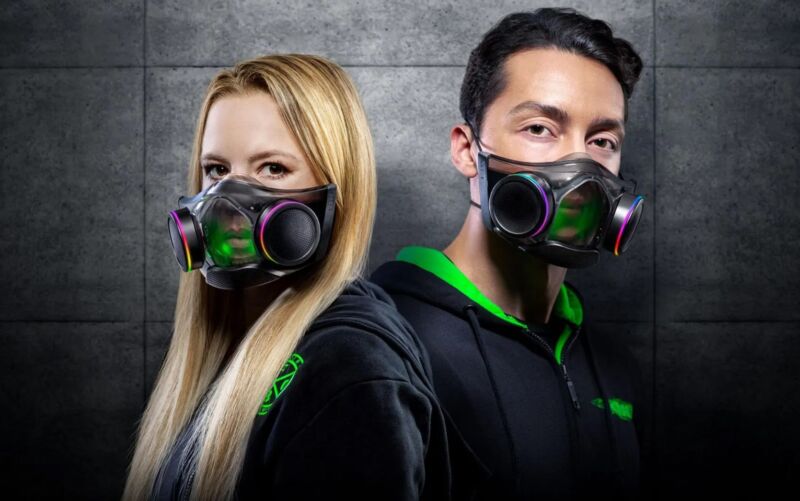
Razer
The Federal Trade Commission (FTC) announced this week a proposed settlement [PDF] against Razer that would see the tech company pay $1,171,254.33 for its misleading claims about the Zephyr RGB face mask. Razer marketed the device as offering capabilities similar to those of an N95 respirator.
On October 21, 2021, Razer began selling the Zephyr and its replacement filters. Razer continued to sell the mask until January 2022 and kept pushing the filters until July 2022, according to the FTC’s complaint [PDF].
Per the FTC, when Razer.com listed the Zephyr in 2021, it said that the mask offered “replaceable N95 Grade filters” and that Zephyr was “FDA-registered and lab-tested for 99 percent BFE [bacterial filtration efficiency]” and offered “greater protection compared to standard disposable/cloth masks, and filters air both inhaled and exhaled to safeguard you and others around you.” Razer’s site also reportedly said that the mask was “not tested specifically against the COVID-19 virus, but offers the same functionality and adequate protection due to its 99 percent BFE rating.”
The FTC’s complaint, filed in the US District Court for the Central District of California, contains examples—from online statements from Razer’s CEO to posts on Razer’s social media accounts and website—describing the Zephyr as offering N95 or N95 grade capabilities since at least January 2021.
However, the FTC said that Razer never got the Zephyr tested by the National Institute for Occupational Safety and Health or the US Food and Drug Administration and that the Zephyr never received N95 certification.
“[Razer] falsely claimed, in the midst of a global pandemic, that their face mask was the equivalent of an N95 certified respirator,” Samuel Levine, director of the FTC’s Bureau of Consumer Protection, said in a statement.
FTC says Razer knew Zephyr wasn’t N95 equivalent
The “99 percent BFE rating” that Razer touted only referred to the mask’s filters, however, and per the FTC’s complaint: “Razer had no evidence that the mask as a whole would offer adequate protection against the COVID-19 virus based solely on the BFE characteristic of the filter material.”
It continues:
In fact, Razer knew from testing the PFE [Particulate Filtration Efficiency] performance of the Zephyr that the mask as a whole performed worse with respect to filtering out foreign material than the filter material did on its own.
In the months before the Zephyr’s release, a third party, Intertek, tested the mask. The best results for the device showed it reaching a maximum PFE level “of 83.2 percent with the fans off and 86.3 percent with the fans on” and that the mask “frequently tested much lower,” per FTC’s complaint. The figures are notably lower than the minimum PFE level of 95 percent required for an N95 respirator.
Razer kept pushing Zephyr despite warnings
The FTC’s complaint against Razer, which is best known for high-priced, RGB-riddled PC gaming peripherals, claimed that Razer continued promoting the Zephyr despite consultants highlighting the mask’s lack of certification and protection.
“Their use of deceptive advertising and misinformation posed a risk to public health and safety,” the FTC’s complaint said.
According to the FTC, in March 2021, Intertek warned Razer via email against saying that the Zephyr uses an N95 grade filter because N95 “is not relevant to this product, and the claim will cause confusion.”
Still, on August 20, 2021, Razer CEO Min-Liang Tan said via Facebook: “One of our beta tests of the Razer Zephyr pinged me and said, ‘Isn’t this just an N95, but a lot more comfortable and reusable?’ Well, that’s really the point. For us to achieve N95 grade 99 percent BFE filters and ensure it’s reusable, all other features are secondary.”
The FTC also accused Razer’s senior director of regulator and compliance of deciding in September 2021 to remove disclaimer text on the Zephyr’s packaging that employee testers proposed, namely that the mask “is not a medical device, respirator [or] surgical mask” and that the “product is not FDA-approved.” Razer’s ultimate disclaimer noted that the mask is not personal protective equipment and is only intended for use with Zephyr Filters, though.
In November 2021, the Justice and Consumer Protection Agency of Hamburg, Germany sent Razer a letter telling the firm that it opened an inquiry about the Zephyr’s health claims, the FTC said. Razer stopped selling the mask in the European Union on December 13, 2021, after receiving a follow-up letter, but continued selling the device in the US.
Fewer than 6 percent of US customers refunded … so far
On January 13, 2022, after pressure from reviewers and Razer’s global PR director, Razer publicly backtracked on its claims. In an email to customers, Razer said that while the Zephyr’s filters were “tested for 95 percent Particulate Filtration Efficiency (PFE) and 99 percent Bacterial Filtration Efficiency (BFE) … the wearable by itself is not a medical device nor certified as an N95 mask.” Razer also said it would remove all references to “N95 Grade Filter” from marketing materials. However, the FTC said that only customers who bought the mask from Razer’s website or provided their emails to physical Razer stores when buying a mask received the email.
Further, Razer’s email reportedly failed to mention that the company offered full refunds. Due to Razer declining refunds for users outside the 14-day purchase window or who had used or opened the mask and/or filters, Razer reportedly refunded fewer than 6 percent of Zephyr purchases in the US.
However, the proposed settlement against Razer includes a $100,000 civil penalty, plus $1,071,254.33, which the FTC said is equal to the amount of revenue Razer made from the Zephyr and will go toward refunding “defrauded consumers.”
Razer didn’t respond to Ars’ request for comment before this story’s publication. We’ll update if we hear back.
